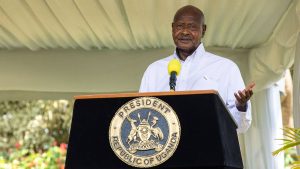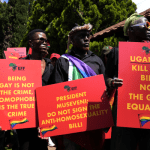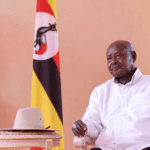Ugandan President Yoweri Museveni has declined to sign a contentious new anti-homosexuality bill that, in some circumstances, carries the death penalty, and has urged for it to be amended.
Museveni’s decision was announced after a meeting of MPs from his ruling party, almost all of whom support the bill.
According to a statement, the group voted to bring the bill back to the National Assembly “with suggestions for improvement.”

At the meeting in Kampala, the capital, Mr. Museveni criticized homosexuality, declaring that “Europe is lost. So they want us to be lost too,” according to video that UBC, a public broadcaster, has made available.
Museveni also praised lawmakers for approving the bill, which drew international condemnation.
Mr Museveni told MPs he had no objections to sentencing, but had doubts about rehabilitating people who have been gay in the past and would like to find a new life.
It was agreed that the bill would return to Parliament for pardons to be considered before he could sign it into law.
Homosexuality is already illegal in the East African country under a colonial-era law that criminalizes sexual acts “against the order of nature”. This offense is punishable by life imprisonment.
The international community is pressuring Mr Museveni to veto the bill, which must be signed by him to become law.
The United States has warned of the economic consequences of passing this law.
In a statement released on Thursday, Amnesty International urged Museveni to veto what the organization calls a “draconian and overly broad” bill.
The bill has broad support in Uganda, including from religious leaders and others who have called for a tough new law against gays.
It was introduced by an opposition MP, who said its aim was to punish the “promotion, recruitment, and funding” of LGBTQ activities in the country.
Only two of the 389 deputies present during the voting session opposed the bill. The bill provides for the death penalty for the offense of “aggravated homosexuality” and life imprisonment for “homosexuality”.
Aggravated homosexuality is defined as cases of sexual relations involving people infected with HIV as well as minors and other categories of vulnerable people.
Prison sentences of up to 20 years are proposed for those who defend or promote the rights of LGBTQ people. A suspect convicted of “aggravated homosexuality attempt” can be jailed for 14 years and the offense of “attempting homosexuality” carries a sentence of up to 10 years, according to the bill.
Anti-gay sentiment in Uganda has grown in recent weeks following press reports of acts of sodomy at boarding schools, including at a prestigious boys’ boarding school where a parent accused a teacher of abusing her son.
The Church of England’s February decision to bless civil marriages of same-sex couples has also angered many people in Uganda and elsewhere in Africa, some of whom consider homosexuality imported from abroad.
Homosexuality is criminalised in more than 30 of Africa’s 54 countries.














